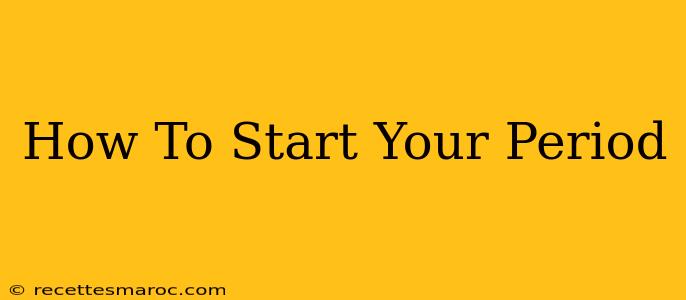Menstruation, or your period, is a natural process that marks the beginning of puberty in girls and women. It's a monthly cycle involving the shedding of the uterine lining. While the start of your period is a significant milestone, there's no magic trick to "start" it. Instead, this guide explains what to expect, what influences it, and what to do when you're concerned about its absence.
Understanding Your Menstrual Cycle
Before diving into the specifics, let's understand the basics. Your menstrual cycle is governed by hormones and usually lasts around 28 days, but it can vary. The cycle comprises several phases:
- Menstruation (Period): This is the phase where the uterine lining sheds, resulting in bleeding for a few days.
- Follicular Phase: Your ovaries prepare to release an egg.
- Ovulation: An egg is released from an ovary.
- Luteal Phase: The body prepares for a potential pregnancy; if fertilization doesn't occur, the uterine lining breaks down, leading to menstruation.
When Does Menstruation Begin?
The onset of menstruation, also known as menarche, typically occurs between the ages of 10 and 16. This is a wide range, and there's significant variation based on genetics, nutrition, and overall health. Factors influencing the timing of your first period include:
- Genetics: If your mother or sisters started their periods early or late, you're likely to have a similar experience.
- Body Weight: Being underweight can delay the onset of menstruation.
- Overall Health: Chronic illnesses or nutritional deficiencies can impact your menstrual cycle.
- Ethnicity: Some ethnic groups have a slightly earlier or later average age of menarche.
What to Expect During Your First Period
Your first period might be irregular, meaning the cycle length varies significantly. The flow might also be lighter or heavier than subsequent periods. This is perfectly normal. Here's what you should know:
- Cramps: Many women experience mild to moderate cramps, which can be managed with over-the-counter pain relievers like ibuprofen.
- Mood Swings: Hormonal fluctuations can impact your mood in the days leading up to and during your period.
- Flow: Expect a variable amount of blood loss, ranging from light spotting to heavier bleeding.
What to Do If You Haven't Started Your Period by Age 16
If you haven't started your period by age 16, or if you've experienced a significant change in your menstrual cycle after previously having regular periods, it's important to consult a doctor or gynecologist. They can perform a physical exam and possibly some blood tests to rule out any underlying medical conditions. Don't hesitate to seek medical attention – it's crucial for your health and peace of mind.
Taking Care of Yourself During Your Period
Managing your period effectively is vital for your well-being. Consider these steps:
- Hygiene: Use sanitary pads, tampons, or menstrual cups to manage your flow and maintain hygiene. Change these regularly.
- Pain Management: Use over-the-counter pain relievers for cramps. Heat packs can also provide relief.
- Nutrition: Maintain a balanced diet to support your overall health during your menstrual cycle.
- Rest: Allow yourself adequate rest and relaxation, especially if you experience fatigue or discomfort.
Starting your period is a normal and significant step in a woman’s life. By understanding the process, recognizing influencing factors, and knowing when to seek medical advice, you can navigate this transition with confidence. Don't hesitate to talk to your mother, a trusted adult, or your doctor if you have any questions or concerns.

